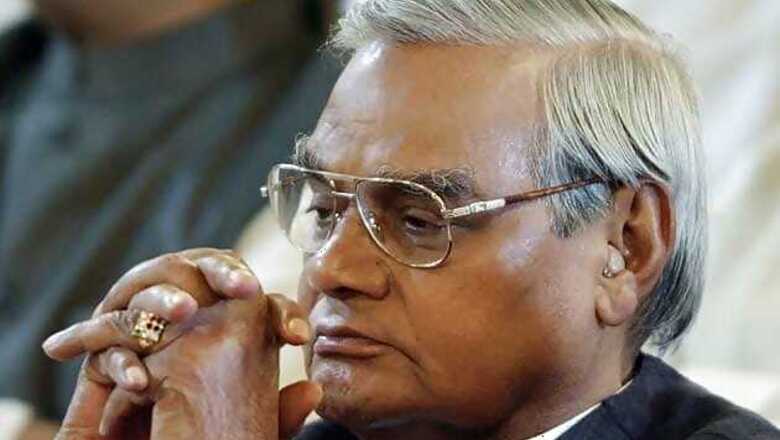
views
New Delhi: The Narendra Modi led NDA government at the Centre has conferred Bharat Ratna on iconic leader and statesman Atal Bihari Vajpayee. Ending months of speculation a communique from the Rashtrapati Bhawan on December 25, 2014 announced Bharat Ratna for former prime minister Atal Bihari Vajpayee.
The BJP had promised that they would confer Bharat Ratna on Vajapyee, if the party is voted to power.
Vajpayee was the first person associated with Rashtriya Swayamsewak Sangh to become the prime minister of India and the first non-Congress prime minister to complete a full term in office. His long and winding political career is replete with ups and downs, spanning more than five decades in public life.
Associated with the RSS from a very young age he was deputed to work with the political affiliate of the Jan Sangh in early fifties. Vajpayee was mentored by Jan Sangh stalwarts Shyama Prasad Mukherjee and Deen Dayal Upadhyay.
Early in his political career, he was elected to the Lok Sabha in 1957 from Balrampur in Uttar Pradesh and impressed many with his oratorical skills.
With the early and untimely demise of his mentor Deen Dayal Upadhyay, the mantle of the Jan Sangh leadership fell on the shoulders of Vajpayee, Nanaji Deshmukh, Balraj Madhok and LK Advani.
Vajpayee became the president of Jan Sangh for the first time in 1968. He was also an active participant and face of the anti-Emergency movement led by Jai Prakash Narain. Vajpayee was incarcerated for many months along with other Jan Sangh leaders. He was first arrested and sent to Bangalore central prison along with LK Advani.
For the larger opposition unity to take on Indira Gandhi, the Jan Sangh merged with the Janata Party and Morarji Desai became the prime minister. Vajpayee became the external affairs minister in the Janata Government in 1977.
The implosion of the Janata Party on the issues of dual membership of Jan Sangh leader's and their association with the RSS led to the formation of Bhartiya Janata Party. He became its first president in 1980.
The elections after Indira Gandhi's assasination and anti-Sikh riots resulted in BJP's rout with the party winning just 2 seats in 1984 general elections. Vajpayee himself lost to young Madhav Rao Scindhia in Gwalior.
But the opening of the locks at the disputed site in Ayodhya led to a resurgence of sorts for the BJP. Again the BJP joined the anti-Congress opposition led by VP Singh's Janata Dal, but this time it supported the Janata Dal government from outside, only to withdraw support over the Mandal-Kamandal row.
It was during the Congress government of PV Narsimha Rao that the BJP consolidated its position between 1991 to 1996, winnning key state elections like Gujarat and Maharashtra.
In the run up to the 1996 general elections, LK Advani declared Vajpayee as BJP's PM candidate. The BJP emerged as the single largest party and Vajpayee was sworn in as the prime minister. Having failed to muster numbers in 13 days, Vajpayee had to tender his resignation.
The opportunity arose again in 1998, this time the BJP could garner numbers in the Lok Sabha. But again with the AIADMK withdrawing support after 13 months, Vajpayee had to call elections in 1999.
Finally in 1999, Vajpayee was sworn in again as PM a comfortable majority with TDP lending outside support. As PM, Vajpayee was quick to give his go ahead for the nuclear test at Pokhran. He had emerged as the liberal and acceptable face of the BJP and led the country during the Kargil war.
His attempts to make peace with Pakistan with a bus trip to Lahore and then invitation to Pakistani military dictator General Pervez Musharraf for the much hyped Agra summit were perhaps the high points in his foreign policy. As the leader of the country Vajpayee never shied away from making his point even to the discomfort of some within his own party.
After the Gujarat riots in 2002, reacting to criticism of the then Gujarat chief minister Narendra Modi, he had famously said "Rajdharma ka palan karna chahiye". In 2004, a confident BJP called elections before time riding on the India Shining campaign. Despite pollsters giving the BJP an edge, the party lost the elections. 2004 was the last election Vajpayee would contest as he slowly withdrew from active politics.
He now lives at a bungalow on Krishna Menon Marg in New Delhi with his family. His health condition has also been deteriorating.




















Comments
0 comment